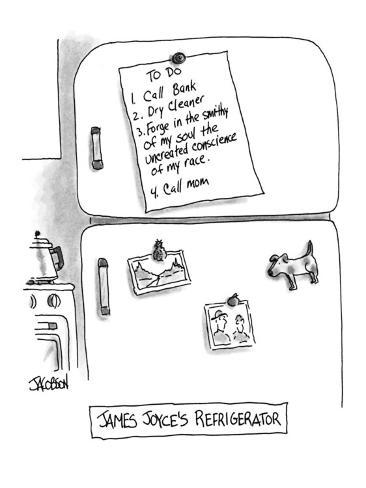I really think this time I might quit reading
Ulysses for good.
I have rarely given up on a book, because I don't like to start a book and then stop a book, but I honestly cannot see the point of continuing to struggle through this book.
Why am I doing it? I keep asking myself.
Once a week, I force myself to sit down and read one of the current
classics, and I use that term loosely, and in that sentence, or I suppose it's a clause, there is the root of the problem:
I force myself.
Has anything good ever come of being
forced to partake of entertainment? I say
no. Forcing someone to do something almost certainly deprives that thing of any entertainment value and virtually guarantees that the person will not like it. Consider an example: suppose you are doing something. Reading, or watching tv, or juggling, or whatever, and someone hollers at you and says "
Hey, come look at/listen to/smell/experience this book/video/shoe/thing I found." Are you predisposed to enjoy that thing? Not if you are me. If you are me, you are probably annoyed at the person and think "
Oh, god, here's two minutes of my life gone now," which says a lot about me, a lot about the kinds of things people foist off on me, and probably very little about real people and/or the real world.
But that is me, and that is the problem: I am not enjoying
Ulysses anymore, and haven't for a long time and I feel, at 35% of the way through a book, that I have given it a fair shake to turn into something and it's not. It's really not. It's so far away from turning into something enjoyable, in fact, that I cannot conceive of the set of circumstances under which this book would become meaningful for me to read.
The latest, and last, installment that I read consists of
exactly the same freaking thing that all prior installments have consisted of. Want to write a James Joyce novel? Here is how you do it:
A. Think of a character.
B. Now think of 753 other people with vaguely similar sounding names.
C. Now give all 754 of your people nicknames they will use for each other.
D. Begin talking about your "main" character.
E. Randomly skip from the main character's 'adventures' to things the other 753 people are doing.
F. Introduce roughly 200 new people, all at once.
G. Have you made up some of your own words to use? Try that. It's fun!
I. Remember that main character? So does the reader. MAKE SURE HE DISAPPEARS FOR LENGTHY PERIODS OF TIME.
F.
In fact, screw the reader? Is he still working on making it through the book? Time to shift perspectives, sometimes in the same sentence! MAKE HIM WORK FOR IT.
G. Now mention that the sky is blue.
That is a James Joyce book.
There is no point to this, or at least none that couldn't have been made in a short story that might have been mildly amusing. There is no plot structure. There is no imperative taking the reader forward. I think it has been months, in real time, since I heard from Bloom and
I cannot even remember what it was Bloom was doing.
I tried treating this book as poetry, enjoying it for the language, as I was told to do by someone, but there is a limit to even the amount of 'poetry' I can take, and I'm giving up.
I get it, James Joyce. Things were grim for Dubliners. They were poor. They had lively minds. They thought about sex and God and death. And the town was dirty. Or I assume I get it, because if I have gotten any meaning from your book, it was
in spite of you, not because of you.
It's not even that the book was written a hundred years ago or something like that. I mean, I know that some books are harder to read because writing styles were different and language shifts and all, but this book was written around the time that Mark Twain was writing and... probably other people were writing, too, and I've read older stuff than Joyce, and didn't find it so comically bad. It's not like the book is 400 years old and written in old English. It's just deliberately hard to read, and what is the point of that? Why work to make your book more difficult to read than it has to be?
I'm sitting here, and I'm actually getting more than bored, I'm getting a little annoyed, that I've spent so long working on this book, waiting for it to become something that was worth my time, something that I wasn't working to read, and
it has not. And I'm 44 years old, and I work 50 hours a week and have household chores and obligations that take up a lot of my time, so I haven't got an infinite amount of time for entertainment, and I get annoyed when some of my entertainment time is taken up with something that completely fails to be worth my while, as this book has.
When I began this post, I wasn't 100% sure I
was going to quit. Or at least I thought I wasn't 100% sure, but looking back on this, I think my mind either was made up and I didn't want to admit it, because it feels like
quitting. I don't like to
quit, and I don't like to think that everyone else in the world, or at least that portion of everyone else in the world who has read
Ulysses is smarter than me or better than me because they were able to read this stupid book and (maybe?) enjoy it. But I suspect that many people who claim to have read
Ulysses either did so because
they were forced to or did it out of a sense of obligation, the way I picked it out, originally -- "
This book is famous I must be supposed to read it"-- or maybe they're lying. I'd be hard-pressed to believe that someone read this book purely voluntarily and also enjoyed it. If someone made that claim to me, I'd be suspicious of them and not like them much, the way I am when people say "
I never watch television."
And if everyone's reading it because we think we're
obligated to read it, WHY? I made this point a long time ago when I did a
post about the crappy books we're foisting off on kids in schools, the point being that whatever merits you think you are teaching, there are better ways to teach them than forcing kids to read something. Want to teach kids about star-crossed lovers? DO NOT USE ROMEO AND JULIET, it is hard to read and frequently boring.
Want to teach people about life in Dublin at the turn of the century, Ditto Joyce. Which would make a good name for a character in a story and I may use that one of these days, but I digress.
I am
not against difficult-to-read. Possibly one of the most difficult books I ever read was
Foucault's Pendulum, by Umberto Eco, a book that was dense with mythology and which drops the reader in at the near-end of the story and the circuitously loops back around to tie everything together, and it was extremely rewarding, but that is because there is "
Difficult-to-Read" in the sense that the topics are weighty and the story is complex and so forth, and there is then "
Difficult-to-Read" in that the story is poorly written and stupid and made hard to read solely for the sake of being hard to read, like the way David Foster Wallace managed to make a joke of a book (literally; it was called
Infinite Jest) and have critics adore it probably mostly because of the Emperor's New Clothes effect. I put Joyce into that latter category.
And so I'm giving up on
Ulysses, and, as I think of it, I'm giving up on
The Odyssey, too. I have just punched the button to remove
Ulysses from my Kindle and... *pause* now I've done that with
The Odyssey, too, which is not nearly as satisfying as I thought it would be, in that the little icon still remains there, staring implacably at me, so probably I should've gotten a physical copy of the book just so I could have thrown it out, like I did with
Infinite Jest, the ultimate review.
There will be a new Classic, soon, that I'll begin working on.
Here's another link to that post I mentioned:
The Five Best Books Schools Should Have Kids Read (And The Five Crummy So-Called Classics They Would Replace)




















